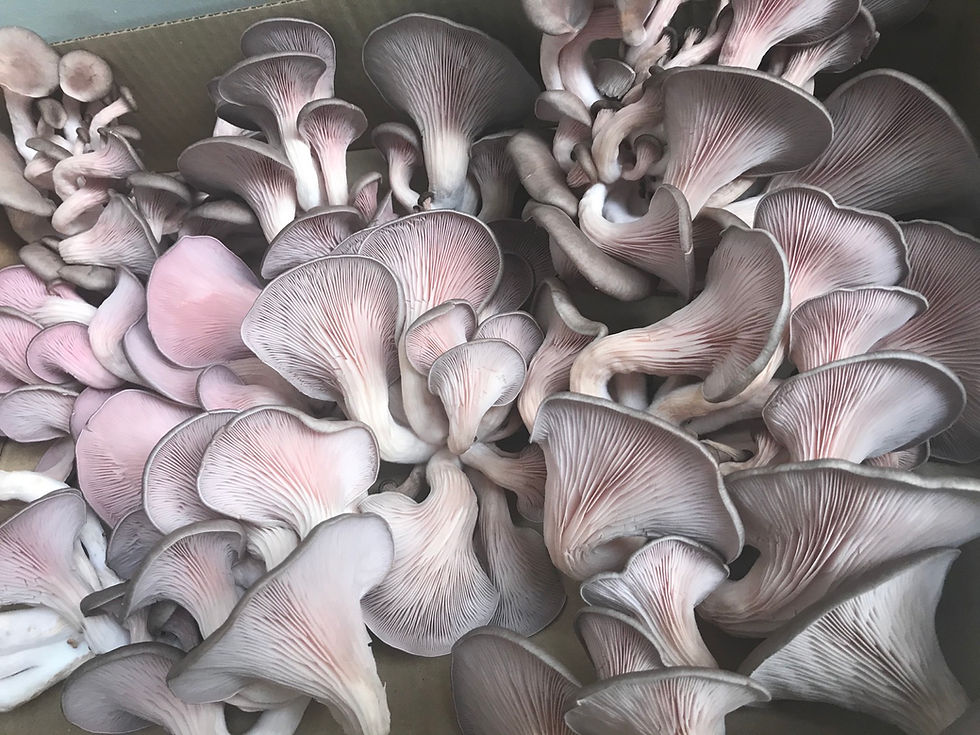Mushrooms in general.
- Bea

- Jun 4, 2020
- 2 min read

MUSHROOMS IN GENERAL
Hardly anyone knows it, but mushrooms are in fact neither plants nor animals. They represent their own unique group among the so-called “eukaryotes”, living organisms that have a typical cell core. Contrary to plants, which mushrooms were classified as for a long time, they do not have any chlorophyll nor photosynthesis. The mushroom metabolism is based more on chemosynthesis. They transform organic substances including wood into chemical compounds through enzymes, leading to the formation of new earth materials. Mushrooms fulfil very important tasks in nature. They detoxify the earth, like algae in water. They also ensure, for example, that minerals and nutrients in the earth can be processed by plants. They also break down dead organisms into their components that then enter the natural cycle again as nutrients.
The importance of mushrooms for human beings goes way back. Apart from their function as a food, the healing effect of mushrooms has been prized for thousands of years in Asia and North America. They were even already used in this function in ancient Egypt and the Roman Empire. In Central Europe, the healing powers of certain mushrooms were known far back in the Middle Ages, but the knowledge about edible and medicinal mushrooms was virtually lost later.
The significance of mushrooms soon becomes clear if one considers how a deficiency in nutrients and vital substances can affect human beings. For example, fatigue, headache, exhaustion, lack of vitality and poor concentration, as well as a wide array of illnesses.
At MycoBee Farm, we focus primarily on basidiomycetes (standing fungi), whose bioactive substances are important in terms of nutritional physiology. These mushrooms supply high-quality protein building blocks, some even all eight amino acids essential for human beings. The constituent substances are combined so beneficially that it ensures a high bioavailability and effectiveness (usability of the substances for the body).
Mushrooms are among the few organisms that can also process wood. Types of mushrooms that grow on wood therefore contain some unique and valuable constituent substances that are not contained in any other foodstuffs. This fact alone is a reason to eat mushrooms regularly. Mushrooms form enzymes that allow the hyphae to penetrate into the wood or the substrate in order to process it. These enzymes in turn are important for the detoxification of our body.
Mushrooms are true vitamin boosts and important suppliers of a wide range of vital nutrients. Apart from vitamins B, D and E, they contain many organic vital substances and minerals, along with protein and carbohydrates. The balanced combination of the nutrients and vital substances they contain also makes mushrooms so unique.
Mushrooms contain around 90 percent of water, two to six percent of carbohydrates and only small quantities of fat. Their protein content if 1.5 to 4.5 percent per 100 grams and, depending on the type, can constitute up to 40 percent of raw protein in the dry mass. This mushroom protein contains all eight essential amino acids that the human body cannot produce itself and must therefore by supplied with from the outside.
The strengths of mushrooms also include their rich content of fibre and flavouring substances, as well as B vitamins. They also only contain few calories (20 to 40 kcal per 100 grams). There ergosterol content, a precursor of vitamin D, is also remarkable.
SSource: www.mykotroph.de


Comments